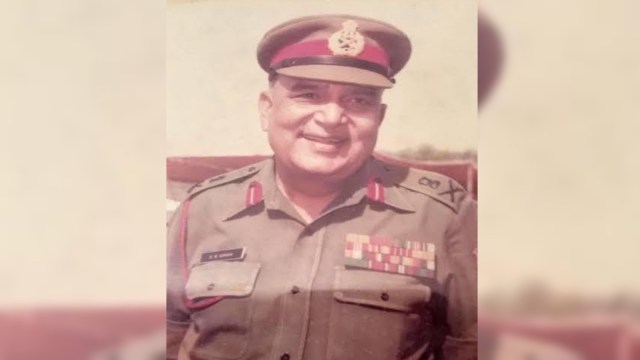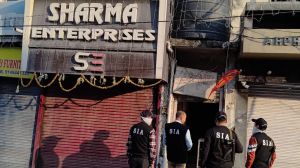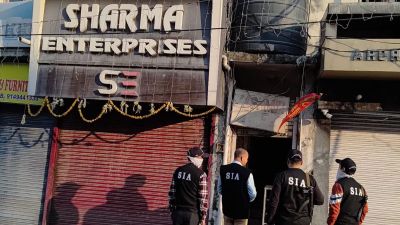Military Digest: 40 years of Op Blue Star — Recalling Lt Gen Sinha’s firm views on Army storming Mehta Chowk Gurdwara
There has been much speculation that the resistance of Lt Gen Sinha to use his troops at Mehta Chowk Gurdwara may have cost him his appointment as Chief of Army Staff.
 Lt Gen S K Sinha. (File photo)
Lt Gen S K Sinha. (File photo)The 40th anniversary of Operation Blue Star passed away peacefully in Punjab earlier this month. The Army’s intervention in Golden Temple has long been a topic of debate among military men as well as historians who have compared it with subsequent Black Thunder Operations carried out with better results and less damage.
However, hindsight is always 20/20, as the saying goes, and it is difficult to reassess the conditions and decision-making choices available to the people in authority in the government and the Army at the time.
The anniversary also gives a chance to revisit the common-sense warnings put in place by a senior Army officer anticipating such an operation well in advance. These set of rules devised by the then GOC-in-C Western Command Lt Gen S K Sinha, were ignored by his successor Lt Gen K Sundarji when Op Blue Star was launched.
Lt Gen Sinha had the opportunity to study the matter when on an earlier occasion the Punjab government had requested the Army to arrest Jarnail Singh Bhindranwale from Mehta Chowk Gurdwara. Sinha had refused a Punjab government request for armoured personnel carriers to be made available to the Punjab Police to enable them to arrest Bhindranwale.
He reasoned that Army equipment could only be used by the Army and that the police did not have the training to use them. And that the use of such weapon platforms would have national and international repercussions and affect the morale of Sikh soldiers in the Army. In his book, A Soldier Recalls, Lt Gen Sinha writes that he advised using police or CRPF and BSF for the task and that if the situation went out of control for them then the Army’s help could be sought and it would be provided.
Interestingly, soon after, when Lt Gen Sinha was on a border tour in Rajasthan, bypassing him, the then Vice Chief of Army Staff got in touch with the Chief of Staff of Western Command, Lt Gen J K Puri, asking him to ensure the arrest of Bhindranwale that night and give a completion report by morning.
Puri accordingly put a Gorkha Rifles battalion in Amritsar on standby for the task but he also took care to call up his Army Commander, Lt Gen Sinha, to apprise him of the orders given by the Vice Chief.
A livid Lt Gen Sinha immediately cancelled the orders and said no troops would be moved without his express orders and then went on to speak with the Army Chief Gen K V Krishna Rao. Sinha expressed his apprehensions about the Gorkha battalion being used overnight without daytime reconnaissance and also without proper preparation. He also opined that the Army should not get involved in a pure police action.
The Army Chief spoke to Prime Minister Indira Gandhi and confirmed to Lt Gen Sinha that the Punjab Police will be used for the Mehta Chowk operation. The subsequent police operation cost many lives before Bhindranwale could be arrested.
Subsequently, Lt Gen Sinha made detailed plans on how to carry out an Army intervention in Gurdwara and to ensure that the psychological impact of such an operation on the Sikhs was kept to a minimum. However, between the period of 1982, when these instructions were recorded by Lt Gen Sinha, and June 1984 when Op Blue Star took place, the on-ground situation in Punjab had worsened and his ideas were never implemented.
But the graduated approach which he had recommended appears to have been utilised with great success in Operation Black Thunder 1 and 2 when militants who had again holed up inside Golden Temple were cleared from it.
There has been much speculation that the resistance of Lt Gen Sinha to use his troops at Mehta Chowk Gurdwara may have cost him his appointment as Chief of Army Staff. On May 29, 1983, he was informed in a cursory manner by Gen V K Krishna Rao that the government had chosen to appoint Lt Gen A S Vaidya, then Eastern Army Commander as the Chief.
On June 2, 1983, Lt Gen S K Sinha, then Vice Chief of Army Staff, resigned from service. Exactly a year later Op Blue Star was put into action in Punjab.







